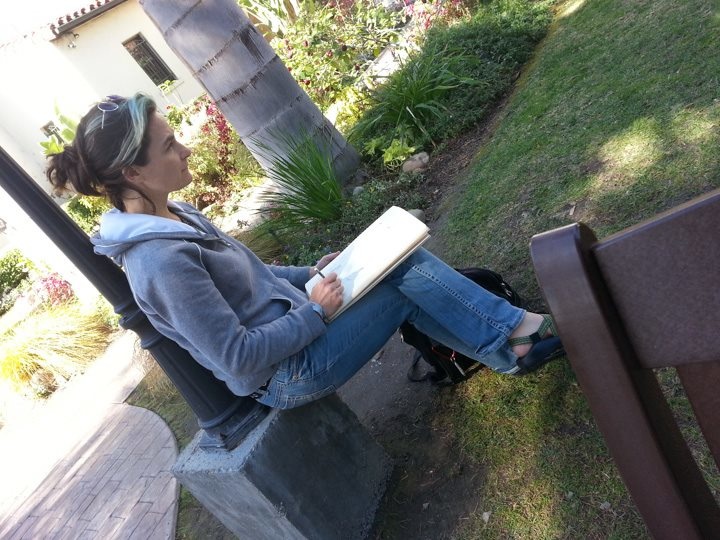The Cutting Yield
by Hillary Jacques
Illustrated by Galen Dara | Edited by Brian J. White
October 2014
Gramma Gershon taught me many things. When to pick berries to capture the brightest color and sweetest taste. Why to avoid wild mushrooms. Plump and meaty as they were, they held radiation and would for years to come. How to flavor the meat of a man so that, while it might still grip at the mind, it wouldn’t stick in the gullet.
In the fall we suspended ropes of drying herbs from the turret over the dining hall, and the entire compound smelled of basil, rosemary, and sinsemilla. As a child I played in the green shadow of the gentle curtain, until a visiting trapper found me there and told me I smelled good enough to eat.
That was the year that Gramma Gershon took me into the kitchens with her, surrounding me with fire and steam and the clatter of pots. I bent my head to the tasks of chopping and peeling, mixing of rubs, and mastering of a brown oil roux. Through the swinging doors, I watched as the soldiers marched out to patrol, and, later, as they dragged each other back in. Occasionally one arrived at the back door, accompanied by the Captain of the Guard. It always happened at night — after the soldiers had eaten their fill and drunk more than they’d been built to hold — so the poor soul’s brothers and sisters couldn’t see.
I asked Gramma Gershon if they knew, our rough guardians who faced the roving militias with their ground-shaking machines and who dusted the slavers who prowled our forest on silent feet. If they knew what we did with their fallen.
“They know, but it is our job not to allow them to think on it,” she said. “A soldier can do much on a belly full of good food. Leave that same body hungry, and the mind sets to worrying, and now you’ve made a hole that doubt can fill. Long as I’m here, they’ll believe the pantries and larders are full. This is a fortunate place. It is a treasure. Now hand me that jar and I’ll show you how to make a clove-studded leg.”
Many a wayfarer was tamed by Gramma’s cooking. Those who’d wandered from their minds and morals found them again on plates trimmed with savory morsels. Those who didn’t reform, we made use of them too.
“There might not be much left on this broken Earth,” she took to saying, “but what we have we’ll share if there’s a chance of saving someone. We will share until we’ve nothing left.”
I should have known sooner.
I thought it was her stomach when she took to drinking grapeseed oil. It was a common affliction in the elderly. I couldn’t pass a one without them griping about their bowels and guts. When she took to sucking on cinnamon sticks, I told myself it was a toothache. I told myself over and over, so there was no room for doubt to creep in. Only when she laid a dried violet on her cracked red tongue and closed her eyes to enjoy the blossom’s crackling burst did I understand.
“It’s your time,” I said, not looking up from packing a row of pink snappers in salt. One by one, their bubbled blue eyes and sharp, sharp teeth disappeared. An hour in the oven and they would emerge – eyes deflated and gloomy lips shriveled – as succulent as anything served before the Flash.
“When it is my time, I will be ready.” She’d been a girl when the world ended, had outlived starvation, sickness, and slavers. She’d built a home in the center of the compound. Her ovens were its heart, her cooking the blood that connected us all. Nothing was served that she did not taste first. The world was gray and the world was cold, but no plate left her kitchen that was not comforting and memorable.
Like a sleepwalker in a dream of plenty, I prepared her meal. Bright radishes and carrots around a pile of cutlets, gleaming with drippings. Narrow racks of ribs that had smoked all night. A briny terrine, both peppery and sweet. Dry-fried liver with lemon and garlic.
I tasted every dish that passed through the swinging doors. She would have been proud of her last meal.

